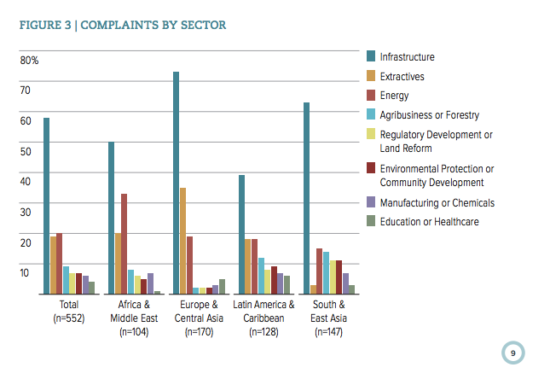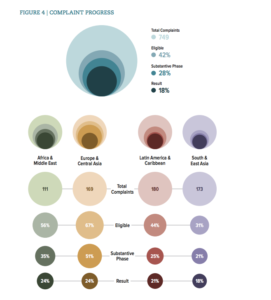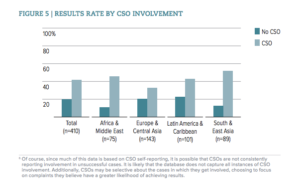New Data Report: Mapping Accountability

Hard data can be an important starting point for conversations about what is working and what is not, in any field. In the growing field of accountability offices for international finance projects, field-wide data remains hard to come by. Accountability Counsel aims to help bridge this gap with our ongoing work to develop and publish field-wide statistical data.
Today we release our latest data report, “Mapping Accountability: A Regional Look at Complaints in Development Finance.” The report dives into a comparison of complaints filed to 12 accountability offices over the past 21 years to assess trends and variances in complaints filed across four world regions: Africa and the Middle East, Europe and Central Asia, Latin America and the Caribbean, and South and East Asia. It updates on case statistics from “Glass Half Full: The State of Accountability in Development Finance,” published last January by 11 organizations, including Accountability Counsel.
The report finds that infrastructure projects are the number one sector driving complaints across all world regions, accounting for 39 percent of complaints in Latin America all the way up to 73 percent of complaints in Europe and Central Asia. Energy and extractives sectors account for the second and third largest portions of complaints in most regions. One exception is South and East Asia, in which less than 4 percent of complaints were filed about extractives industry projects. This statistic raises interesting questions about extractives industry development in South and East Asia. One possible explanation is that extractives projects in that area are mostly financed by institutions that do not provide affected people the opportunity to raise complaints with an accountability office. Further research is required, however, to test this theory.
The report also looks at the progress of complaints through accountability office processes and the outcomes achieved. At the eligibility phase, complaints progress remarkably differently across regions; while 67 percent of complaints from Europe and Central Asia were found eligible, only 31 percent of complaints from South and East Asia passed this initial hurdle. Cases may be found ineligible for many reasons, ranging from a complaint’s failure to follow complex procedural filing requirements to complaints that were simply misfiled and fall outside of an office’s mandate. Most offices are only mandated to accept complaints about social and environmental harms caused by a relevant project, and at many offices complaints must be filed by people directly affected by that project. 
Despite these variations in eligibility rates, complaints across all four regions show similar rates of results: between 18 percent and 24 percent of closed complaints in each region achieved results. In this report, results are defined as a published compliance review report or a negotiated settlement agreement. Examining results in this way is important to understand whether complaints progress to the final step envisioned by each accountability office’s process, but it does not answer the critically important question of whether complainants – the communities affected by international projects – were satisfied with the outcome they achieved through the process.
In every region, the involvement of civil society organizations (CSOs) in supporting a complaint correlates with a higher rate of results, but the strength of this correlation varies by region. Results were achieved in 52 percent of complaints from South and East Asia filed with CSO support, but only 16 percent of cases filed by community complainants alone – a difference of 36 percentage points. In Europe and Central Asia the difference is much smaller, with 34 percent of complaints filed with CSO support achieving results, compared to 21 percent of complaints filed without CSOs.
These findings could be related to a number of factors. Differing education and literacy rates, for example, may mean that communities in some regions are better able to advance complaints successfully even without assistance from CSOs. Careful CSO selection processes, which may involve an initial weighing of case merits, may also play a role. However, this latter consideration would not account for the variation across regions, which instead seems to imply regional differences in the ways that different types of complainants interact with the accountability office processes.

As practitioners dedicated to working with accountability offices and advancing accountability in development finance, these relatively low results rates are for us a call to action. We firmly believe that accountability offices can and should provide results for more communities who have been harmed by internationally-financed projects, and we continue to work with these offices and development finance institutions to encourage improvements. Read more about our work to advance greater effectiveness across accountability offices on our Policy Page.

